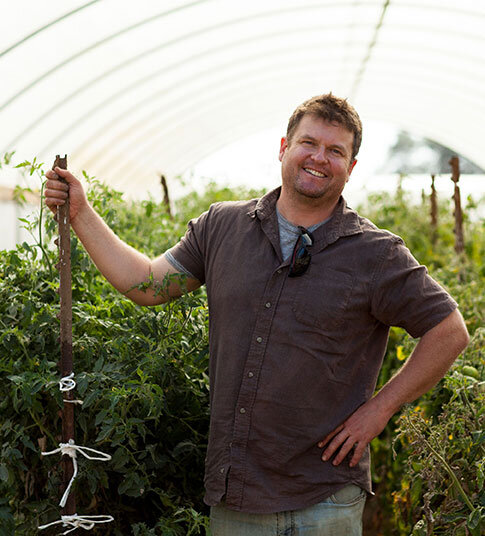Azolla farm - Pleasant Grove, CA
FARMER: Scrivner Hoppe-Glosser
Azolla Farm was established in 2010 by Scrivner Hoppe-Glosser and Jon Price. Former high school friends and coworkers at Chez Panisse, they decided to build a farm that would be founded on a shared passion for local food, hard work, and a commitment to organic farming practices. With Jon’s prior experience on farms in upstate New York, and Scriv’s intimate knowledge of the restaurant industry, they began knocking on doors to get their product directly into chefs’ hands. After three arduous seasons fueled by fervor and true love of the land, Azolla Farm began regularly supplying fresh produce to chefs in Sacramento, Tahoe, and the Bay Area. In 2013, Leila Ansari joined the team and swiftly learned that farming—especially on a small scale—is much tougher than it looks. But the rewards from a labor of love can be great, and Leila followed in Jon’s footsteps to become Scriv’s partner and carry on Azolla’s practice of ethical land stewardship and commitment to raising a variety of high-quality vegetables. Each season, we work about three acres of land in Pleasant Grove which is twenty miles north of Sacramento. Thanks to the long, warm season in our area we’ll be growing in 2016 many varieties of heirloom and cherry tomatoes, sweet peppers, cucumbers, and herbs. Through the season we aim on having beets, kale, chard, squash, eggplant, celeriac, turnips, radishes and some rare edible greens.
Factoids about the name Azolla Farm:
· Azolla is a small, tiny fern that grows locally around our farm on the surface of sloughs or any slow-moving water
· Aka mosquito fern, duckweed fern, fairy moss.
· Azolla has nitrogen-fixing capabilities that lend to its use as a biofertilizer especially in Southeast Asia where it acts as a sort of mulch to suppress weed growth on rice paddies when they’re flooded in the spring.
· It’s a highly efficient plant (for its size) in terms of its role in the ecosystem: it’s an essential nutrient to other organisms, helps to regulate invasive species even though Azolla itself is non-invasive, and studies have shown that it helps to reverse the effects of greenhouse gases.
· I mean, it’s pretty much the coolest.

